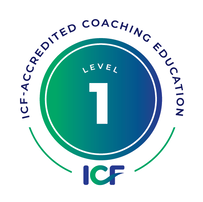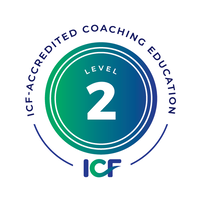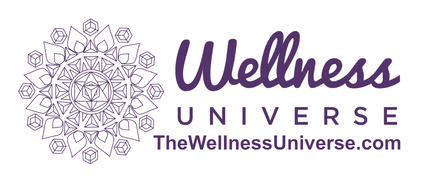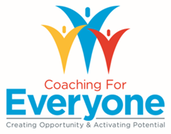|
Bryant Alexander:
All right, we are live. So, another week of e-quips. How are you doing today, Laurel? Laurel Elders: Really good. Really good. I'm excited to be with you again. And welcome, everyone, to our coaching quips. These are our, weekly coaching mastery tips designed to equip future coaches and also coachlike leaders with empowering approaches to consider. I'm Laurel Elders, the founder of the Institute for Integrative Intelligence. I'm an ICF master-certified coach. I got my start in the coaching field in 2005, and now consider myself a thorough coaching geek. And I have with me Brian Alexander. Bryant is a coach and works with us in admissions. Bryant is helping people align with the coach training options that are best suited for them and their organization. Bryant, feel free to give everyone a shout-out. Bryant Alexander: Yeah. Thank you for that intro, Laurel. So, yes, I am working with the institute in the capacity of an admissions coordinator. So, if you're interested in coaching, if you want to learn more about coaching, feel free to reach out to me, because I'm also a student, and Laurel is one of my instructors. So any questions, feel free to reach out to me. But I also work as a full-time coach outside with tech organizations specifically and tech professionals. So if you're interested in that, please reach out to me. But that's a little bit about me. I don't want to take up too much time. I want to pass it back over to you. Laurel, please. What are we talking about today? Laurel Elders: Okay, so, today's topic are going to be the three layers to coaching mastery. So, last week, we covered coaching versus advice giving. So if you missed that, we will place the link below (CLICK HERE) so that you can come back later and check it out. And during that e-quip, we mentioned coaching mastery. And we wanted to take that topic a little bit deeper into the different layers to coaching mastery. Bryant Alexander: Okay. Laurel Elders: And notice I said "layers" and not "levels". Bryant Alexander: Okay. Tell me more, please. Laurel Elders: I found that the more you study coaching, the more layers you add to your depth as a coach. Bryant Alexander: Uh-huh. Laurel Elders: But what's really cool is that the layers you add to your depth actually lend to the new levels that your clients will be reaching in their work, in their lives. Okay, so three. There's three layers. The first layer, skills. So, let's go into this a little bit more. So, I know, Bryant, you're familiar with the ICF core competencies. Bryant Alexander: Yes. I have no choice but to be. Actually had a class yesterday about it. We had to look through a script and identify the competencies throughout the script, it was probably. I didn't realize it was going to take that much work, but it was a lot of fun just kind of going through the different competencies. But yes, I have to be familiar with those. Laurel Elders: The ICF core competencies are that layer one of the skills. So those include: a coach has a solid foundation in coaching. In other words, the coach is demonstrating ethical practice. So that's competency A-1. The coach is embodying a coaching mindset, competency A-2. The coach is also trained to co-create the engagement. So that's different from other approaches like consulting or mentoring, teaching. And that includes establishing, maintaining agreements, cultivating trust and safety, maintains presence to the client and the process. So that's competency B3-5. And then the coach is also trained in communication efficacy. So this is active listening, being able to hear what's not said as well. Bryant Alexander: You said a lot there. Okay. So level one, it's a lot already in there, but something that you said was "co-create". All right. I think that has become a lot of a, it's become a popular term. So could you expound on what you mean by co-create, please? Laurel Elders: Absolutely. So when a client or employee enters the coaching engagement and this taps into what we were talking about last week, that level one and level or, sorry, journey one and journey two into your potential. The first journey, we can be showing the way. The second Journey, where our true development comes from, is self-discovered. So if you prescribe something, it's not going to be as engaging for the client as if they're a part of the entire process. Bryant Alexander: Okay. And that's the differentiation between where coaching versus consulting is happening, correct? Is that what you're saying? Okay. And then you talked about "evokes awareness". I think that's also something we talk about today. Right. So self-awareness, what does it mean to be self-aware? So in the context of coaching in this first level, what does evoking awareness actually mean? Laurel Elders: So from the coach's perspective, it's asking questions that help the client gain self-awareness, self-attunement and self-generation. Bryant Alexander: Okay. Laurel Elders: So if I show up - I love to give this example - if I show up to work, I have a chip on my shoulder and I'm short with people and I'm closed down, I'm not very open and fun to be with. What are the odds - what's the probability I'm going to get a promotion? Bryant Alexander: Probably not too good. Laurel Elders: But if I get coached and I gain self awareness. I'm able to get rid of - we call it "catch ourselves in the act" - catch the chip on my shoulder, and eventually get rid of the chip on my shoulder. Now I'm showing up to work, open, creative, even fun to be with. What is the probability I might get that promotion? Bryant Alexander: Probably higher, right. Laurel Elders: Right. I may or may not get it, but I've gained access to that possibility, gained new awareness. New self-awareness. Bryant Alexander: I'm glad you use that work example too, because I think that oftentimes you hear people say that, I feel stuck, or they're not giving me this promotion, or I work hard and I'm not getting what I want. Right. And I think what you're alluding to is that awareness allows you to say, what am I doing? Or how can I show up differently? Or what are the things that I might be contributing to me not getting that promotion or me feeling stuck, in this job or in this role. So it's just interesting to kind of hear the importance of self awareness as it applies to work. But also in the grand scheme of life, self-awareness becomes such an important factor because I think what you speak to is just that relationship with yourself and how important that is and how that shows up. Um, and how the self-awareness kind of shapes the way you engage with not only yourself, but also just phenomenon or people, the world, whatever it may be. Laurel Elders: Yeah, absolutely. And it's so connected to the self-generation. Am I generating the outcomes that I want to be and that self-alignment? Am I showing up aligned? So if I've got a chip on my shoulder, I'm actually not showing up aligned with who I am. Because we're not our defense mechanisms, we're not our limiting beliefs, we're not our fears. So how can I get into self alignment to experience that empowerment in the workplace, but also at home? I mean, that's beauty of coaching, right? It goes with us everywhere we go. Bryant Alexander: Wow. And that's just layer one! Laurel Elders: That's just layer one. Within those skills there's eight core competencies, but within those, there's actually 63 subcompetencies. And I just find that really empowering for coach to get that diversity. So, shall we dive into layer two? Bryant Alexander: I don't know. I can walk away with layer one and just be good, but no, let's talk about layer two, please. Laurel Elders: So as we add another layer of depth into our coaching skill set, we start to focus on coaching the person and coaching the whole person. And this, to me, is where the magic happens because whether you're coaching a teenager or a c suite executive, you have a whole person in front of you. And there's a distinction that we make in coaching mastery, and that is to coach the person, not the problem. And when I first heard that, I was like, "yeah, but what exactly does that mean"? It was hard for me to grasp Bryant Alexander: Mhm. Yeah, I think it's still hard to grasp if you're first hearing it, especially if you've never. Because I think that we spend a lot of time on the problem and I think that it might be, I guess, to give an example to that. I think when I was doing a lot more career coaching, I would stay focused on the problem of the resume or the LinkedIn or the interviewing skills, or just I'm not comfortable networking. But when you take it a level, not a layer deeper, which actually causes you to zoom out more, it's like, oh, is it imposter syndrome or is it, just the stories you're telling yourself, is it self-sabotaging behaviors? Is it just confidence? Right. So I think that is how I can best kind of contextualize what it means to not, because I can look at your resume and LinkedIn all day and we can tweak this and we can tweak that. But if you get in front of people and you're having that imposter syndrome, or you're not really comfortably articulating, all right, this is the value that I bring, or you're telling yourself these very negative stories about your experience and what you actually bring to the table. That's actually getting to what that problem is versus staying at the, oh, we're going to go through a mock interview and we're going to talk about these things. So, such an interesting concept. Laurel Elders: It is. And that is a perfect example how much deeper we can go. Also a really great example of how, learning the coaching side of it is so impactful for consultants because they can take what they're teaching or helping with the details, externals, help the client internalize it, and that's where the transformation happens. Bryant Alexander: Great point, because coaching is also for consultants, and it might even help you become a better consultant because you're not just fixated on the problem, which is what consultants are hired for. Figure out all my problems. I'm saying yes, the coaching actually is something that you can add to your tool belt to where it's just like, what are we actually trying to figure? What is the problem we're actually solving here? Laurel Elders: So the other thing I wanted to share about coaching the person, not just the problem, is because you might want to ask, "why would we do this"? don't clients and employees come to us to solve a problem? They do, but if I solve it, I actually take away their agency and their personal power to self-generate. So there's a little bit of coaching - it is developmental. The client is learning and self-developing from within. Bryant Alexander: Agreed. Laurel Elders: So, one way to look at this is as someone comes to me for coaching, and I look at it like "I'm coaching this person, they're solving the problem". So I'm not focused on the problem. I'm focused on what is going on with my client. So: What is being said? What is not being said, what is happening somatically, visually, what's happening in the client's context, what's being reflected through beliefs, motivations, values. And a lot of those sometimes are under the surface. So coaches are trained to pick up on nuances that indicate more of that root level cause so that we can form more powerful questions to get the clients to go deeper. Bryant Alexander: Yeah, I think those things. So, self-generation is important because if you just put it in layman's terms, it's just like, are you more likely to do something that somebody else suggested to you versus actually coming up with your own solution and doing it yourself? And when I was going through that whole coach consulting kind of coaching phase, I found that my clients wouldn't follow through on certain things, and I would ask them why. It's just like I didn't feel comfortable doing that. But when I actually just. What would you feel comfortable doing then? Right. That is a question to where it can be considered a powerful question, because I'm just asking you, I'm putting the ownership back on you as far as what you would do and allowing you to speculate, well, I would do this or I would do that. What's stopping you from doing that then? It just opens a door to a whole different set of solutions. That can actually help the client get to where they want to go. So I think it's really important that self generation, it's just as simple as, like, I want to take ownership for my own development. I want to actually establish these next steps for myself, something that I feel comfortable with versus. I have a manager already. You're supposed to be my coach. I have kids already that are always, like, telling me what they want and what they need. Right. You're supposed to be my coach. How can I take the steps that I want to take in order to move forward. Laurel Elders: Yeah. And that, to me, really connects back to that. Also, the self-alignment piece. When we own an answer, and we're coming to something with full alignment, I mean, wow, the difference is pretty huge. Bryant Alexander: Agreed. Laurel Elders: I think - my theory is that a lot of morale issues are because it just lacks coaching culture, coaching opportunities in an organization for people to start self generating, step into their gifts and power and alignment in more powerful ways. Bryant Alexander: Agreed. Laurel Elders: All right, shall we move on to layer three? Bryant Alexander: Layer three. Coaching for the whole person. Right. Laurel Elders: Coaching "from" the whole person. So we are coaching a whole person. And are we coaching from our whole person? Bryant Alexander: Okay, now the onus is back on the coach, right. Coaching from the whole person. Laurel Elders: So, am I stuck in my head? Am I only coaching from my head? My cognitive space? I like to say coaching from the whole person is where your magic happens. The whole person is where the magic happens. Bryant Alexander: Okay. Laurel Elders: When we coach from our whole person, we're including intuitions, our somatic presence, vision, mindfulness, cognition, creativity. There's all these different things that we're including. And we found eight domains to human potential. So imagine I'm not just engaging my cognition, I'm engaging all of these. And we'll put a link to what those are below. But engaging your coaching at that level gets to be a lot more profound for the coaching, the impact that your coaching can have. Bryant Alexander: Okay, it sounds like mindfulness is there. What's the best way to be mindful within your own body while you're also engaging with somebody else? Laurel Elders: Well, does take practice, right when we're first learning coaching? Of course, like chatter. "Oh, my gosh. Am I doing it right? " "Am I asking the right question? " "What's the next best question? " "Is the client going to get results? " We're stuck in our head. We can sink down into mindfulness, as you said, into a grounded space and really hold that space for the client so that we're using all of our faculties and we're hearing at those deeper levels, the coaching, naturally, there's no push to it. Just naturally becomes more fluid, more powerful, deeper, just naturally. Bryant Alexander: It's amazing to me a level of mindfulness, but also just a level of presence, with everything that you're feeling. Like, if the client says something to you, it sounds like, how does that feel in your body? Right. Like, if a client has a strong emotion, where do you feel that at? Within your own body, but also as you're. And that I guess that kind of just generates within you like a question like, hey, notice there was a strong emotion there. Tell me more about that. Right. That is not easy at all. And the reason I can say that is because I've been on a couple of - because I learned this concept from being on silent meditation retreats. And they teach you so much about how your body responds to things first, not your brain, meaning that you have to be like, let's say if it's a negative emotion, if it's a sensation, it will start in the body and it will work its way up to the brain. Right. And I don't want to get too scientific, but it's just interesting to just understand. We think that our perception, or when we see something, that it starts within the brain and then it's like fight, flight or freeze, but it actually starts in the body. And when you're able to feel where it's at in the body and then it works its way up to your brain, you're able to kind of make a decision on what to do with it. But in coaching, it sounds like when you fill it in the body, it's going to be so organic that it'll just get you to that next powerful question versus thinking too hard. As far as like, this is how I'm going to put this question. Laurel Elders: Yeah, there's a wholeness in our presence. Bryant Alexander: I got you. Laurel Elders: And to me, I love what you just shared. Ah. And it's so aligned with that self-awareness piece. Where am I right now? "Oh, I'm back in my head". Bryant Alexander: M yeah. Laurel Elders: So those are the three layers. As you can see there are ways that you can also identify what level of coach training or what type of training is right for you. Right. So not every person that wants to add coaching skills, the layer one needs to go to all layers, right. Especially - they may serve leaders. All three layers may serve leaders. But just adding coaching skills is often just really profound experience in and of itself. Bryant Alexander: Mhm. And I guess with these different layers let's say I was at home today, right? How would I know what layer that I'm like, I'm here, all right? Or this is what I'm needing. How would a leader know which is right for them? Laurel Elders: I would say depending on what - that's a great question because it's so different for everyone. So I would say if you really care about being a coach like leader so helping your employees self develop into their gift so you're not providing the scaffolding they're doing their own work and learning to be independent thinkers. Bryant Alexander: Mhm. Laurel Elders: That is uh, an excellent time to go for these two layers, if not the three, is just like the icing on the cake. Bryant Alexander: Got you. Yeah, got you. Okay, got you. Go ahead. Laurel Elders: Sorry, I was just going to say, but a lot of consultants or managers, they might just, those coaching skills, that first layer is really impactful too. Bryant Alexander: Yes, a lot in that first layer. I would say you could spend a couple of months on that first layer in itself. Years really on that first layer. So for sure. Laurel Elders: It's so fun to me when people come into the - even just the module one and say, "I didn't realize there was so much more to coaching! " "I thought I'd been coaching for years. " We hear that a lot. Bryant Alexander: Including myself. Laurel Elders: I do want to add is sometimes, just to throw this out there, some mistakes that we see companies make when they do, like an internal coach training - they might put someone in charge that may know a little bit about coaching, but doesn't know the full spectrum of all the skills. And so then sometimes what happens is they end up coming to us later and going, oh my gosh, we could have saved years of time and headaches and had we known that all these layers were there and available to us. So I always invite people, if you have questions about coaching, reach out. This is all we do. You can go straight to us. We're very accessible. We're coaching geeks here at the institute. So we love talking about coaching. Bryant Alexander: Yes. If you have any questions, I am here. As you've already heard, there are so many layers to coaching, even deeper than this. Once you dive into kind of just the subtopics within each one of these layers, I can say one, it doesn't just help you as a leader, as a consultant. I think when you go through coach training at any level or any layer, I think what happens is it just helps you overall as a person, personally, professionally, whatever, it just is a self discovery process. And here at the institute, I really love the emphasis on not just the art of it. Right. I love the science behind it. This program has really helped me with understanding somatics, but in a very in depth way. And for anybody that doesn't know what somatics is, it just has to do with the body. So when sensations come up in your body, just understanding what that is, where it's at, how to actually manage it, those things are so important, especially because we live in an error to where we just have a lot of distraction. We have a lot of screens in our face, and that leaves us in our head all the time, and we usually take the side of thinking versus actually feeling to understand what's really going on. So I think that's one of the, if not my biggest value proposition is that I'm learning about the art and science of coaching. And I think that, is always going to be helpful when it comes to just presenting the value to leadership teams or just if you have your own coaching practice, just your clients and how they actually engage in the coaching. Laurel Elders: Well said. All right, so that wraps us up for today. We hope today's mastery tip is a lantern to your path with coaching. It's our mission to elevate human potential through the art and the science of masterful coaching. Science, as Bryant pointed out, is included. If you're an individual or organizational leader seeking to bring coaching into what you do, please reach out. Bryant is here on LinkedIn. If you're joining us from another platform, you can also, reach to him at: [email protected]. If you are curious, we do teach our Module One: Coaching Fundamentals six times a year, and we launch our full LEVEL ONE- Coaching Foundations and -LEVEL TWO- CPIC coach training program every March and October. These programs are designed to support you and your organization on your journey into coaching excellence. That's one of our passions. And we also are here to help companies increase business performance and leadership impact by developing coaching talent and creating coaching cultures. >> Corporate Training So if you're interested in that, we have three different approaches and ways to support you. So as you can see, lots of options to learn more, please visit us at integrativeintelligence. Global and we will see you next week. Next week we're going to dive into the different styles and types of coaching. Bryant Alexander: There we go. I'm excited about that one. I was excited about this one. I'm really excited about that one. Laurel Elders: Thanks everyone for joining us and we can't wait to be with you next week. Bryant Alexander: Thanks, everyone. Bye.
0 Comments
Leave a Reply. |


 RSS Feed
RSS Feed





